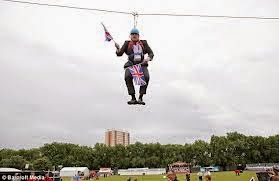London has got itself a mayor who entirely fits the bill. Boris Johnson likes to make a fool of himself in public and share the joke. He’s a fine classical scholar and writes and broadcasts in an amusing and engaging, if slightly superficial, way on Roman history.
 |
| Boris Johnson, Mayor of London "What a great sport I am!" |
Terrorists achieve their primary aim when they terrorise us. And that happens when we panic so much that we’re prepared to give up our own values in response to their actions. Yesterday, it was demonstrated by that same jocular, amusing, bumptious London Mayor.
Boris Johnson has called for a “minor” change in the law so that anyone travelling to the war zones in Iraq and Syria would be presumed to be a terrorist, and liable to prosecution unless they can prove otherwise.
In other words, with this “minor” change he would like to undo a value won and upheld through centuries of agitation for basic rights: the presumption of innocence. The principle means that in any criminal case, it is for the prosecution, backed as it is by all the apparatus of the state, prisons, security services, the police, to prove its case against the solitary individual in the dock, usually supported only by a lawyer.
For Johnson, doing away with this right is a small matter. As a man educated at Eton and Oxford and in possession of a significant fortune, he of course has little to fear from the state. If anything, as a leading Conservative politician, he’s far more likely to be exercising that power against others. What is truly worrying is that he speaks for a constituency within the broader electorate that is all too ready to believe him and give up rights that protect it, in order to seek safety from a supposed terrorist threat.
Why are we talking about such a threat? Because the voice-over on the video that Islamic State released of the murder of American journalist Jim Foley had a British accent. That touched a nerve among many in Britain. But if the result is that we cease to defend fundamental rights, then we shall have given Islamic State a far greater victory than it could have imagined.
Fortunately, Johnson’s suggestion has already been denounced by another leading Conservative, Dominic Grieve, the former Attorney General. He called it “draconian” and said that it would criminalise much legitimate behaviour. However, it’s insignificant that Grieve is the former Attorney General, believed by many to have been sacked for being too liberal for the current government.
That government includes the Home Secretary Theresa May, who intends to bring in new legislation against people and organisations who advocate extremist views.
Interestingly, that’s an even more pernicious intention than Johnson’s, because banning extremism sounds eminently sensible. But who will decide just what’s extreme? Let’s remember that there was a time when campaigning against slavery, or for women to be given the vote, or for Ireland to win its independence, was regarded as extreme.
Do we really want government to decide what is or isn’t extreme? Do we want to give it the power to act against the views people advocate? Might it not be better to have it concentrate only on extreme actions rather than views? Most such actions are illegal already.
These are Tories, who are prompt to talk the language of “British values”, which they insist immigrants must endorse. It seems that they don’t regard presumption of innocence, freedom of thought or freedom of speech as fundamental among such values.
In addition, they proclaim their commitment to small government. It’s curious how easily, then, they advocate initiatives that massively increase government’s capability to intervene in all our lives. And then disguise what they’re doing behind a veil of good sense or, as in Boris Johnson’s case, one of engaging good humour.
It strikes me that as well as needing to deal with actions by Islamic State militants, we in Britain need to be ready to confront another threat far closer to home. And far more pernicious.
4 comments:
My god are you the most un nationalistic individual in the entire UK not a single patriotic instinct in your entire body or mind.
Patriotism, as a great Englishman wrote, is the last refuge of the scoundrel. But I'm strongly committed to the notion that Britain stands for a series of key values: government by consent, the protection of minorities, trial by jury, presumption of innocence, freedom of speech, even more important freedom of thought. Sacrifice them and you hand the terrorists the greatest victory.
A "patriot" who doesn't see that is no lover of this country.
Thank you for a thoughtful post. It's alarming how such "little changes" are being/have been happening on both sides of the Atlantic.
I also find the implications of anyone finding it "unpatriotic" to question this fact very alarming. I don't even want to go down that train of thought, much less arrive at the station it'll take me to - or take all of us to - if these erosions continue.
Presumption of innocence and due process are vital. Things that I've been proud to believe, as a Brit living in the U.S., are still stronger back home than they've become here.
Well said, Kit. There are values that make a nation worth loving – but unconditional love even when it abandons what gives it value is indefensible; sadly it's what patriotism's often taken to mean.
Post a Comment